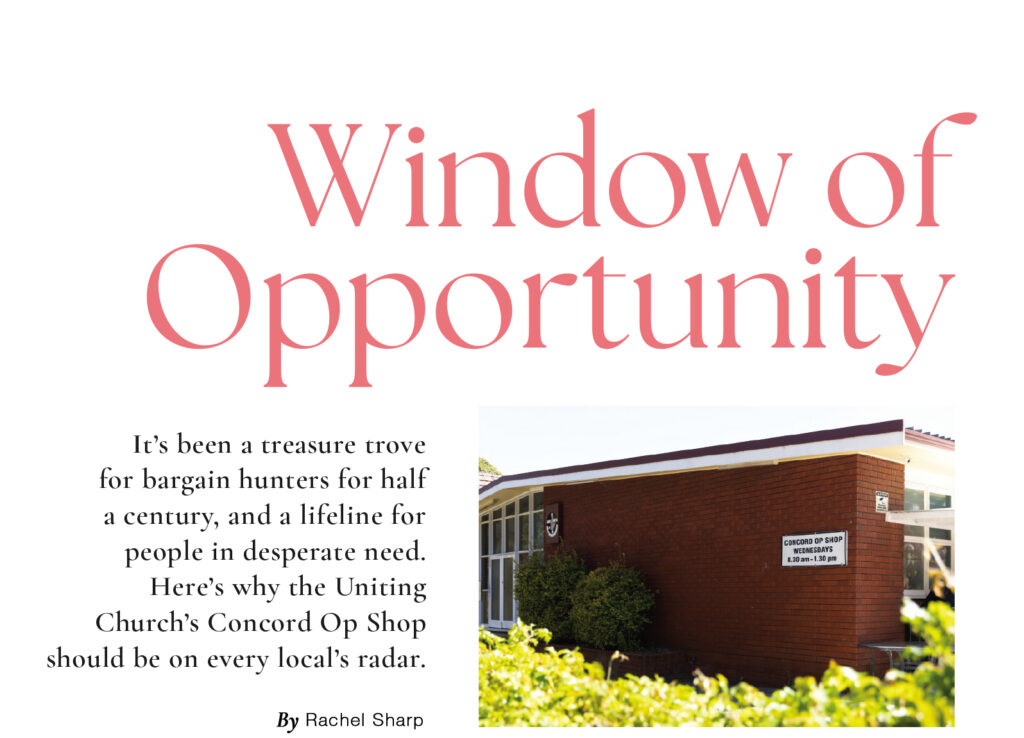
You’ve probably heard the beautiful old idiom, “With the right support, opportunity knocks”. But behind the scenes in a low-key building on the corner of Majors Bay Road and Correys Avenue in Concord, it’s opportunity that’s changing lives.
Since its inception in 1970s by founder Dorothy Hynard, the Uniting Church Concord Op Shop has not only been a place to discover previously loved – and sometimes even brand-new – goods at cheap prices, it has connected community, raising and then giving away hundreds of thousands of dollars to individuals and organisations in dire need.
“Every dollar we make goes to charities like Father Riley’s Youth Off The Streets and the Ted Noffs Foundation,” says Marie Woods, a Breakfast Point local and one of 22 volunteers who staff the store. “We recently started opening on the last Saturday of the month and earnings from that day go to a different cause each time. So far that’s included the Lismore floods, the Tongan tsunami, Barnardos, a handicapped children’s charity, and Dr Nour’s mobile doctor service for the homeless.”
“Funny thing is, a lot of people don’t even know we’re here,” adds Marie, who has donated her time to the shop every Wednesday, and some Saturdays, for the past five years.
To those in the know, though, the store is so much more than just a way to raise funds. It’s a fun place to pick up second-hand gear in great condition (some items still have tags on) at prices that are surprisingly cheap, even by op shop standards. The fact that it’s a little off the beaten path also means there’s plenty of gems to be found – which is rarely the case at op shops in high footfall areas that are picked over by on-sellers.
The Wares
There may have once been a time when shopping at the local charity store carried an unfair social stigma, but as any bargain-loving university student or vintage fashion hunter will now tell you, smart second-hand shopping is celebrated in 2022. It never ceases to amaze volunteers such as Marie that many of the items donated are of exceptional quality. Some are designer brands including Prada, Fendi and Calvin Klein. Other donated items still have swing tags on. (They’ve even received top-of-the-line Le Creuset cookware.)
Luxury labels aside, there are plenty of no-name brands, too. “Our prices are very low compared to other op shops as we like to move our goods quickly so there are different things always on display,” says Marie. Clothes, for example, start from as little as two dollars.
“The list of categories we sell is long but includes things like adult and children’s clothing and shoes, linen, crockery, books, toys, jewellery, records and CDs, baby items, bric-a-brac, small furniture, sporting equipment and electrical goods.” Unsurprisingly, in-demand items such as Lego, computer games, collectible vintage clothing and designer bags sell quickly.
While all donations are gratefully received, the shop does ask that they be in good condition – otherwise valuable funds are wasted paying to dispose of unsellable goods. “That just defeats the hard work our volunteers do,” says Marie.
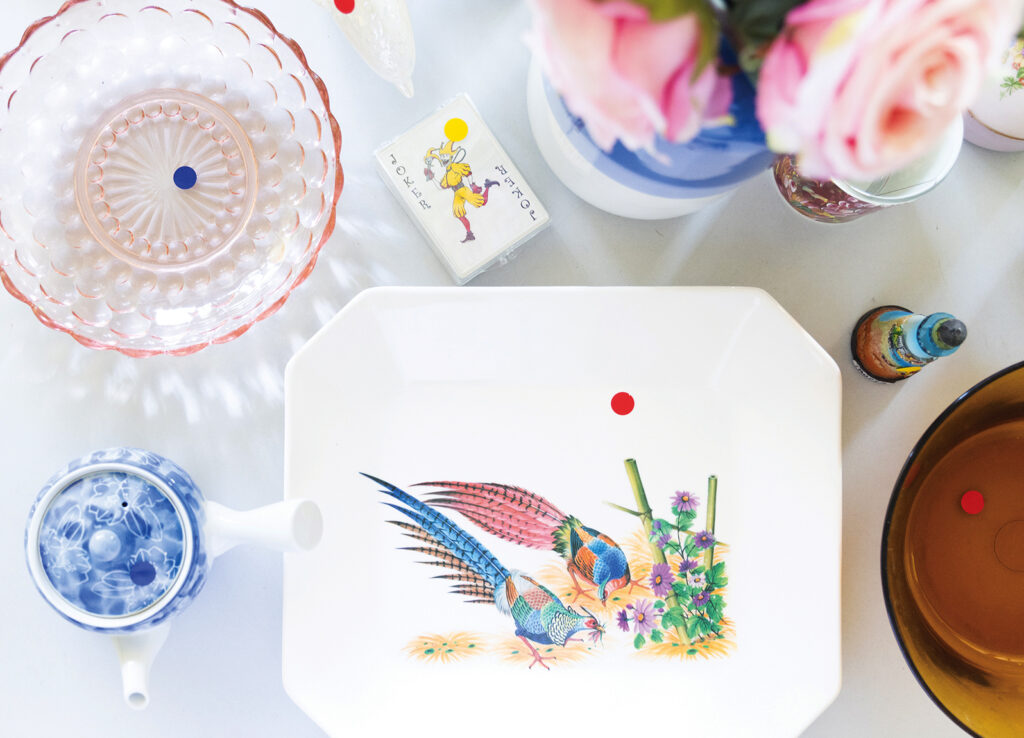
The Uniting Church Op Shop appreciates all donations of goods that are clean, not torn, and in working order. Regretfully, they cannot accept donations of larger furniture as they currently have limited storage.
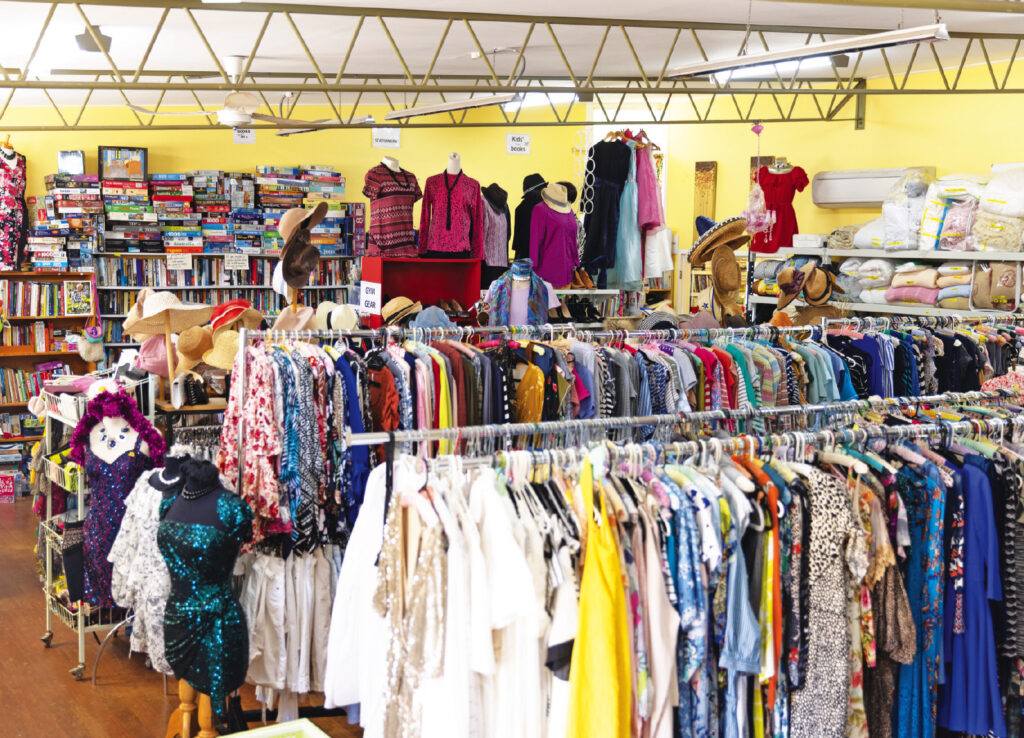
That said, they do their best to avoid throwing away as much as they can. Items only go in the bin if they’re broken or are so dirty, they can’t be cleaned. “We have a big Tongan community in our church – our minister and his wife are Tongan – and they take anything we can’t or don’t sell and send it home [to Tonga] in a container every few months,” says Marie. “I used to worry that some of the clothing wasn’t good enough quality, but the minister’s wife explained that even if, say, a shirt had a rip, they take all the buttons off, sometimes unpick it for the pattern, or cut something out of the other side. They don’t waste anything.”
The Clientele
Just as Concord’s demographic has changed over the past half century, so too has the op shop’s customers. Some are in real need of affordable items, while others just want to see what’s new, says Marie. “A lot don’t need to buy at an op shop but are becoming more conscious of sustainability of our earth, and re-using rather than buying new.”
There’s no question that a mainstream switch to mindful consumerism is needed. Australians are the second-highest consumers of textiles per person of any country in the world after the USA. On average, each Australian disposes of around 23 kilograms of clothing to landfill each year. Shopping second-hand when we can is one simple way to lower that statistic.
Today’s op shop customers are far more tech savvy, too. “Our sales have rocketed over the last few years because we’ve started promoting things online,” says Marie. “One of the ladies here, Tina, has been with us for around 18 months and knows the types of things that will sell, so she posts them on Instagram and Facebook. Today she put a picture of the queen and couple of books about the royal family together as a bundle on social media and one customer was in like a shot to buy it all.”
The Volunteers
Marie has been a congregation member of the Uniting Church, where her children were christened, for more than 35 years but that’s not a prerequisite for volunteering at the op shop. “We’re from all different walks of life and faiths, and we’re all locals except for one of the fellows who comes all the way in from Gregory Hills near Campbelltown. He’s a friend of ours and he helps my husband with larger items we keep in the shipping container – big things like bikes, coffee tables, camping gear and even electrical goods that have been tested, which are harder to manage.” (Other volunteers also help unpack and repack the container goods onto the grass near the shop each Wednesday.)
“All our volunteers enjoy their time at the op shop whether they do only a few hours or many hours. All feel they are giving a little back to the community. Some of them have been working here for decades – like Bernice and Janice, who have been here around 20 and 30 years respectively – while others are quite new,” says Marie.
What the volunteers all have in common is their desire to give back. “My husband and I have always been inspired to help people that are less fortunate. Besides, he’s retired, so what else has he got to do other than sit and read books all day? We look forward to Wednesdays where we see our customers happy to have found their little bit of treasure.”
For more information, concordunitingchurch.org/op-shop @concordopshop
ADDRESS: Corner of Majors Bay Road and Correys Avenue, Concord
OPEN: Wednesdays 8.30am to 1.30pm
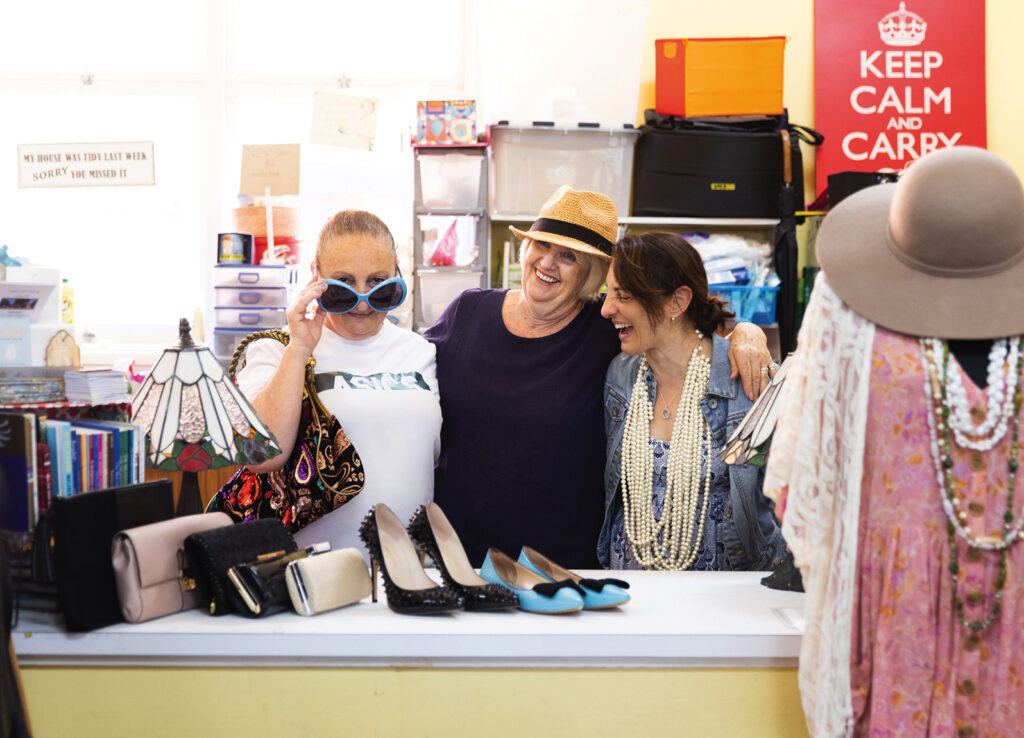


You’ve probably heard the beautiful old idiom, “With the right support, opportunity knocks”. But behind the scenes in a low-key building on the corner of Majors Bay Road and Correys Avenue in Concord, it’s opportunity that’s changing lives.
Since its inception in 1970s by founder Dorothy Hynard, the Uniting Church Concord Op Shop has not only been a place to discover previously loved – and sometimes even brand-new – goods at cheap prices, it has connected community, raising and then giving away hundreds of thousands of dollars to individuals and organisations in dire need.
“Every dollar we make goes to charities like Father Riley’s Youth Off The Streets and the Ted Noffs Foundation,” says Marie Woods, a Breakfast Point local and one of 22 volunteers who staff the store. “We recently started opening on the last Saturday of the month and earnings from that day go to a different cause each time. So far that’s included the Lismore floods, the Tongan tsunami, Barnardos, a handicapped children’s charity, and Dr Nour’s mobile doctor service for the homeless.”
“Funny thing is, a lot of people don’t even know we’re here,” adds Marie, who has donated her time to the shop every Wednesday, and some Saturdays, for the past five years.
To those in the know, though, the store is so much more than just a way to raise funds. It’s a fun place to pick up second-hand gear in great condition (some items still have tags on) at prices that are surprisingly cheap, even by op shop standards. The fact that it’s a little off the beaten path also means there’s plenty of gems to be found – which is rarely the case at op shops in high footfall areas that are picked over by on-sellers.

The Clientele
Just as Concord’s demographic has changed over the past half century, so too has the op shop’s customers. Some are in real need of affordable items, while others just want to see what’s new, says Marie. “A lot don’t need to buy at an op shop but are becoming more conscious of sustainability of our earth, and re-using rather than buying new.”
There’s no question that a mainstream switch to mindful consumerism is needed. Australians are the second-highest consumers of textiles per person of any country in the world after the USA. On average, each Australian disposes of around 23 kilograms of clothing to landfill each year. Shopping second-hand when we can is one simple way to lower that statistic. Today’s op shop customers are far more tech savvy, too. “Our sales have rocketed over the last few years because we’ve started promoting things online,” says Marie. “One of the ladies here, Tina, has been with us for around 18 months and knows the types of things that will sell, so she posts them on Instagram and Facebook. Today she put a picture of the queen and couple of books about the royal family together as a bundle on social media and one customer was in like a shot to buy it all.”
For more information, concordunitingchurch.org/op-shop @concordopshop
ADDRESS: Corner of Majors Bay Road and Correys Avenue, Concord
OPEN: Wednesdays 8.30am to 1.30pm
The Wares
There may have once been a time when shopping at the local charity store carried an unfair social stigma, but as any bargain-loving university student or vintage fashion hunter will now tell you, smart second-hand shopping is celebrated in 2022. It never ceases to amaze volunteers such as Marie that many of the items donated are of exceptional quality. Some are designer brands including Prada, Fendi and Calvin Klein. Other donated items still have swing tags on. (They’ve even received top-of-the-line Le Creuset cookware.)
Luxury labels aside, there are plenty of no-name brands, too. “Our prices are very low compared to other op shops as we like to move our goods quickly so there are different things always on display,” says Marie. Clothes, for example, start from as little as two dollars.
“The list of categories we sell is long but includes things like adult and children’s clothing and shoes, linen, crockery, books, toys, jewellery, records and CDs, baby items, bric-a-brac, small furniture, sporting equipment and electrical goods.” Unsurprisingly, in-demand items such as Lego, computer games, collectible vintage clothing and designer bags sell quickly.
While all donations are gratefully received, the shop does ask that they be in good condition – otherwise valuable funds are wasted paying to dispose of unsellable goods. “That just defeats the hard work our volunteers do,” says Marie.
That said, they do their best to avoid throwing away as much as they can. Items only go in the bin if they’re broken or are so dirty, they can’t be cleaned. “We have a big Tongan community in our church – our minister and his wife are Tongan – and they take anything we can’t or don’t sell and send it home [to Tonga] in a container every few months,” says Marie. “I used to worry that some of the clothing wasn’t good enough quality, but the minister’s wife explained that even if, say, a shirt had a rip, they take all the buttons off, sometimes unpick it for the pattern, or cut something out of the other side. They don’t waste anything.”

The Volunteers
Marie has been a congregation member of the Uniting Church, where her children were christened, for more than 35 years but that’s not a prerequisite for volunteering at the op shop. “We’re from all different walks of life and faiths, and we’re all locals except for one of the fellows who comes all the way in from Gregory Hills near Campbelltown. He’s a friend of ours and he helps my husband with larger items we keep in the shipping container – big things like bikes, coffee tables, camping gear and even electrical goods that have been tested, which are harder to manage.” (Other volunteers also help unpack and repack the container goods onto the grass near the shop each Wednesday.)
“All our volunteers enjoy their time at the op shop whether they do only a few hours or many hours. All feel they are giving a little back to the community. Some of them have been working here for decades – like Bernice and Janice, who have been here around 20 and 30 years respectively – while others are quite new,” says Marie.
What the volunteers all have in common is their desire to give back. “My husband and I have always been inspired to help people that are less fortunate. Besides, he’s retired, so what else has he got to do other than sit and read books all day? We look forward to Wednesdays where we see our customers happy to have found their little bit of treasure.”
The Uniting Church Op Shop appreciates all donations of goods that are clean, not torn, and in working order. Regretfully, they cannot accept donations of larger furniture as they currently have limited storage.
Window of Opportunity
It’s been a treasure trove for bargain hunters for half a century, and a lifeline for people in desperate need. Here’s why the Uniting Church’s Concord Op Shop should be on every local’s radar.
By Rachel Sharp
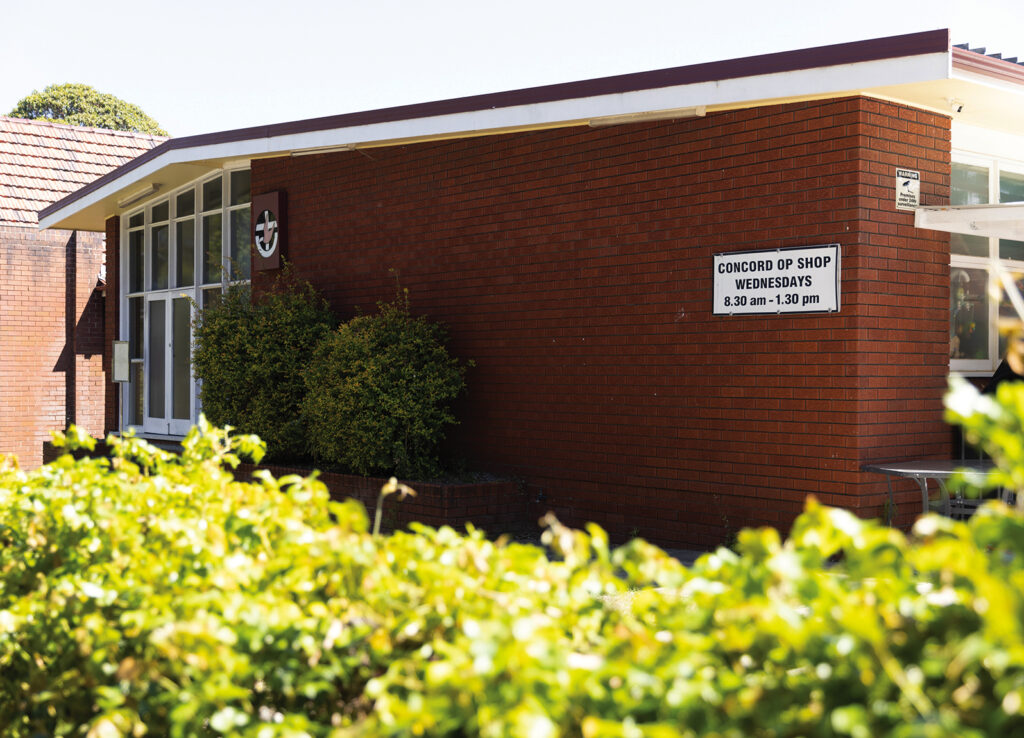
You’ve probably heard the beautiful old idiom, “With the right support, opportunity knocks”. But behind the scenes in a low-key building on the corner of Majors Bay Road and Correys Avenue in Concord, it’s opportunity that’s changing lives.
Since its inception in 1970s by founder Dorothy Hynard, the Uniting Church Concord Op Shop has not only been a place to discover previously loved – and sometimes even brand-new – goods at cheap prices, it has connected community, raising and then giving away hundreds of thousands of dollars to individuals and organisations in dire need.
“Every dollar we make goes to charities like Father Riley’s Youth Off The Streets and the Ted Noffs Foundation,” says Marie Woods, a Breakfast Point local and one of 22 volunteers who staff the store. “We recently started opening on the last Saturday of the month and earnings from that day go to a different cause each time. So far that’s included the Lismore floods, the Tongan tsunami, Barnardos, a handicapped children’s charity, and Dr Nour’s mobile doctor service for the homeless.”
“Funny thing is, a lot of people don’t even know we’re here,” adds Marie, who has donated her time to the shop every Wednesday, and some Saturdays, for the past five years.
To those in the know, though, the store is so much more than just a way to raise funds. It’s a fun place to pick up second-hand gear in great condition (some items still have tags on) at prices that are surprisingly cheap, even by op shop standards. The fact that it’s a little off the beaten path also means there’s plenty of gems to be found – which is rarely the case at op shops in high footfall areas that are picked over by on-sellers.
The Wares
There may have once been a time when shopping at the local charity store carried an unfair social stigma, but as any bargain-loving university student or vintage fashion hunter will now tell you, smart second-hand shopping is celebrated in 2022. It never ceases to amaze volunteers such as Marie that many of the items donated are of exceptional quality. Some are designer brands including Prada, Fendi and Calvin Klein. Other donated items still have swing tags on. (They’ve even received top-of-the-line Le Creuset cookware.)
Luxury labels aside, there are plenty of no-name brands, too. “Our prices are very low compared to other op shops as we like to move our goods quickly so there are different things always on display,” says Marie. Clothes, for example, start from as little as two dollars.
“The list of categories we sell is long but includes things like adult and children’s clothing and shoes, linen, crockery, books, toys, jewellery, records and CDs, baby items, bric-a-brac, small furniture, sporting equipment and electrical goods.” Unsurprisingly, in-demand items such as Lego, computer games, collectible vintage clothing and designer bags sell quickly.
While all donations are gratefully received, the shop does ask that they be in good condition – otherwise valuable funds are wasted paying to dispose of unsellable goods. “That just defeats the hard work our volunteers do,” says Marie.

That said, they do their best to avoid throwing away as much as they can. Items only go in the bin if they’re broken or are so dirty, they can’t be cleaned. “We have a big Tongan community in our church – our minister and his wife are Tongan – and they take anything we can’t or don’t sell and send it home [to Tonga] in a container every few months,” says Marie. “I used to worry that some of the clothing wasn’t good enough quality, but the minister’s wife explained that even if, say, a shirt had a rip, they take all the buttons off, sometimes unpick it for the pattern, or cut something out of the other side. They don’t waste anything.”
The Clientele
Just as Concord’s demographic has changed over the past half century, so too has the op shop’s customers. Some are in real need of affordable items, while others just want to see what’s new, says Marie. “A lot don’t need to buy at an op shop but are becoming more conscious of sustainability of our earth, and re-using rather than buying new.”
There’s no question that a mainstream switch to mindful consumerism is needed. Australians are the second-highest consumers of textiles per person of any country in the world after the USA. On average, each Australian disposes of around 23 kilograms of clothing to landfill each year. Shopping second-hand when we can is one simple way to lower that statistic.

The Uniting Church Op Shop appreciates all donations of goods that are clean, not torn, and in working order. Regretfully, they cannot accept donations of larger furniture as they currently have limited storage.
Today’s op shop customers are far more tech savvy, too. “Our sales have rocketed over the last few years because we’ve started promoting things online,” says Marie. “One of the ladies here, Tina, has been with us for around 18 months and knows the types of things that will sell, so she posts them on Instagram and Facebook. Today she put a picture of the queen and couple of books about the royal family together as a bundle on social media and one customer was in like a shot to buy it all.”
The Volunteers
Marie has been a congregation member of the Uniting Church, where her children were christened, for more than 35 years but that’s not a prerequisite for volunteering at the op shop. “We’re from all different walks of life and faiths, and we’re all locals except for one of the fellows who comes all the way in from Gregory Hills near Campbelltown. He’s a friend of ours and he helps my husband with larger items we keep in the shipping container – big things like bikes, coffee tables, camping gear and even electrical goods that have been tested, which are harder to manage.” (Other volunteers also help unpack and repack the container goods onto the grass near the shop each Wednesday.)

“All our volunteers enjoy their time at the op shop whether they do only a few hours or many hours. All feel they are giving a little back to the community. Some of them have been working here for decades – like Bernice and Janice, who have been here around 20 and 30 years respectively – while others are quite new,” says Marie.
What the volunteers all have in common is their desire to give back. “My husband and I have always been inspired to help people that are less fortunate. Besides, he’s retired, so what else has he got to do other than sit and read books all day? We look forward to Wednesdays where we see our customers happy to have found their little bit of treasure.”
For more information, concordunitingchurch.org/op-shop @concordopshop
ADDRESS: Corner of Majors Bay Road and Correys Avenue, Concord
OPEN: Wednesdays 8.30am to 1.30pm
Sign up to view digital copies
of Bon Vivant Magazine